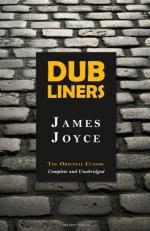|
This section contains 4,192 words (approx. 14 pages at 300 words per page) |

|
SOURCE: Chaudhry-Fryer, Mamta. “Power Play: Games in Joyce's Dubliners.” Studies in Short Fiction 32, no. 3 (summer 1995): 319-27.
In the following essay, Chaudhry-Fryer examines the games played by children and adults in Dubliners.
In one of Dubliners' most arresting observations, the boy in “Araby” says he has “hardly any patience with the serious work of life which seemed to me child's play” (26-27). Reading this stunning paradox in reverse offers a way of approaching the stories through Michel Foucault's theories about power and knowledge, as well as Mikhail Bakhtin's analysis of comedy: embodying both subversion and inversion, child's play is the serious work of life.
Foucault argues in Power/Knowledge that the challenge to accepted truths comes through “the insurrection of subjugated knowledges,” admitting into the discourse what has been systematically excluded by the “hierarchy of knowledges” (81-82). Dovetailing with Foucault's theory, Bakhtin's formulation of carnivalesque laughter allows people...
|
This section contains 4,192 words (approx. 14 pages at 300 words per page) |

|


